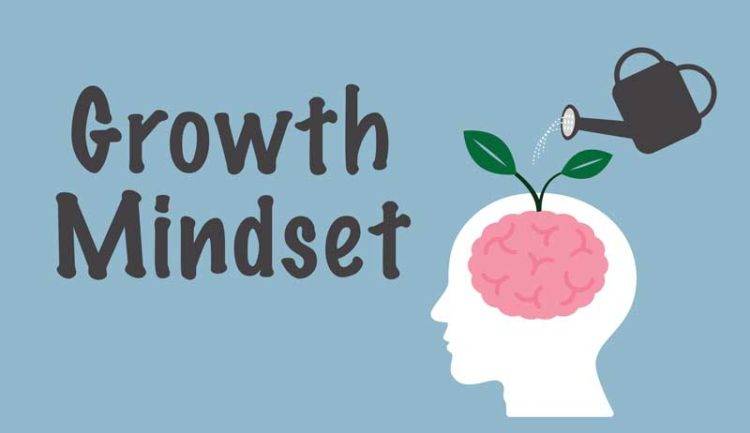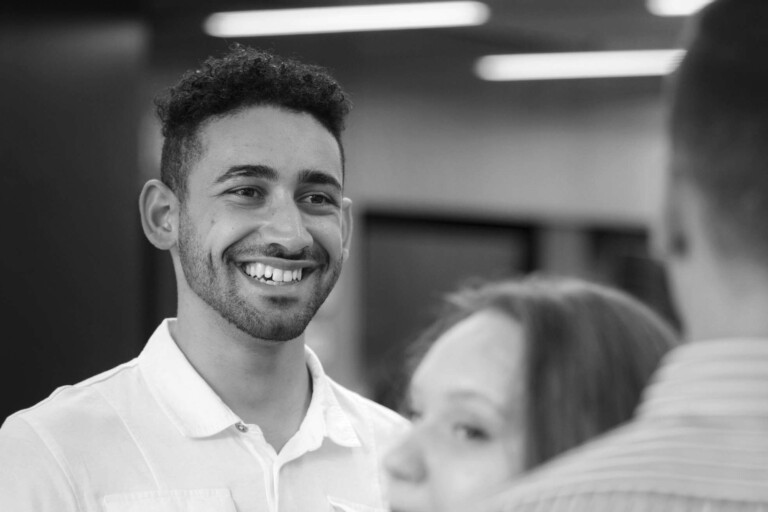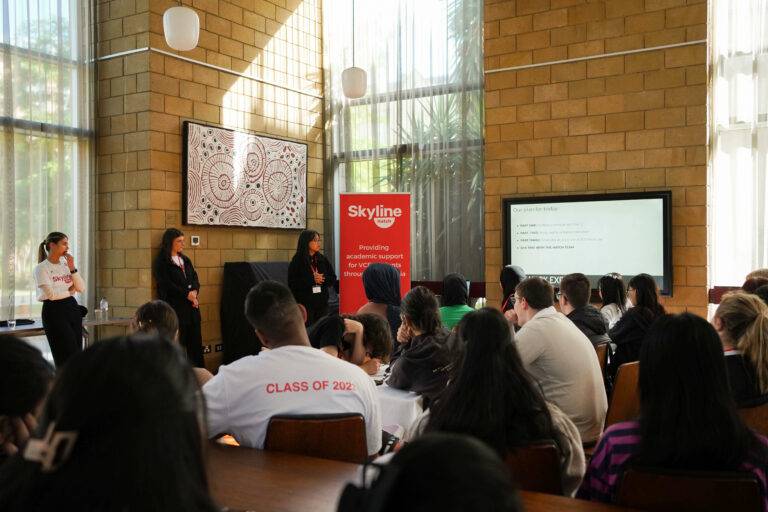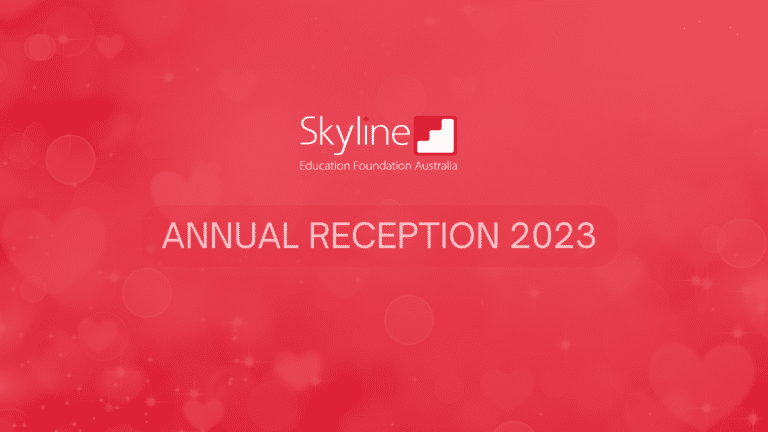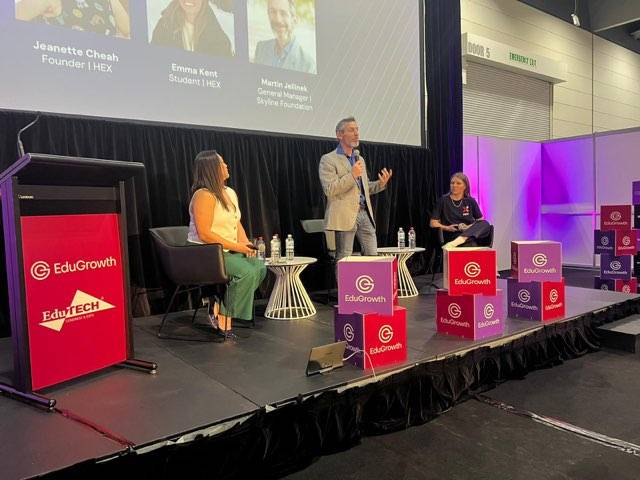Overcoming obstacles to a growth mindset
– Dr Elizabeth Hartnell-Young
Skyline’s Theory of Change describes the students selected for the program as ‘high ability students who are gifted and/or academically talented, with a growth mindset, leadership potential, and resilience in the face of their social and economic challenges’.
What exactly is a growth mindset?
In her book Mindset, psychologist Carol Dweck (2006) reports her rather surprising discovery that some young people were very comfortable with the challenge of difficult tasks, even embracing failure. Many realised that, no matter their perceived ability, if they put in an effort and persevered, they could achieve as well as the most talented learners. She labelled this a ‘growth mindset’, in contrast to ‘a fixed mindset’, which is characterised by comments such as ‘I’m no good at Maths’ or even claiming a student has a certain fixed IQ throughout their life.
ReachOut Australia suggests on their website that someone operating with a growth mindset is likely to:
- welcome challenges and new things
- learn from the people around them
- understand that in order to get what they want, they have to work hard
- recognise failure as an opportunity to learn
- acknowledge their own weaknesses, and focus on improving them.
In contrast, a person with a fixed mindset is likely to:
- not deal very well with setbacks
- try to hide their mistakes
- believe that their abilities are limited to one area
- engage in negative self-talk by saying things like, ‘I can’t do it’
- avoid challenges
It’s not always easy to maintain a growth mindset in the face of life’s challenges, and without a range of role models for inspiration. Skyliners sometimes report derision from peers at school: the ‘tall poppy’ syndrome, often expressed as ‘Why should you be getting the awards?’ However an important strategy is to aim for a personal best, rather than comparing oneself with others, and to think of some failures as ‘success not yet’.
Fortunately, Dweck also found that a particular mindset doesn’t have to be set in stone. We can shift our attitudes and beliefs based on new experiences and learning, seeking feedback and constructive criticism along the way. This demands resilience, but is a powerful tool for growth.
Mindset is Self-Belief
Sven Hansen, Founder of The Resilience Institute, believes that a growth mindset is central to everything that we do (Hansen, 2020). His research has found that a person’s mindset is their widely-held belief, rather than an evidence-based description of their talents. However mindsets related to conservative views, pessimism, avoidance of risk taking, and anxiety appear to correlate with family background, indicating that a wider range of connections might be helpful to broaden attitudes.
In relation to working with others, Hansen says:
Our research shows that the learned ability to bounce, grow, connect and find flow is an integrated set of skills. A skilful performer takes on increasingly difficult tasks. Adversity and failure are inevitable. They must learn to bounce forward fast. As they learn bounce, they grow physical, emotional and mental skills. These skills are connected in a team, game, or specific situation to achieve the flow state.
He notes the example of the All Blacks rugby team from New Zealand, which has drilled these skills under the name of ‘red or blue, decide, do’ (Evans, 2019). This is the discipline of engaging with a challenging moment knowing that we can choose between a ‘red’ emotionally reactive approach, or a ‘blue’ thoughtful and deliberate approach. Players practice selecting the ‘blue’ by stepping back, up and in. They ‘step back’ to calm the ‘red’, then step up to get a clear view, and then step into the situation fully committed and deliberate.
Being open to the possibilities
Although a growth journey begins with the individual, there is a social dimension, like the team approach, to developing a growth mindset. This is where teachers, parents and significant others, like Skyline, can play a role. When there are many challenges in the life of a student and their family, we night need to:
- offer multiple invitations
- persevere with personal contact
- provide introductions
- clarify the expectations of the challenge or opportunity.
Developing a plan of action with short and longer-term goals and actionable steps can help people become more receptive to growth. It can include something as simple as planning to do something different each day: meeting a new person, or reading a new book. The resilience element of developing a growth mindset is based on acknowledging that there are always going to be obstacles. The environment changes, and events can create huge barriers. Resilience means adjusting the pathway, looking left and right rather than just straight ahead, and making space for other opportunities.
An Alumna’s Story
Felicia Nguyen, a Skyline alumna who is now a third-year communication design student at RMIT University, has displayed a growth mindset since her school years at Keysborough Secondary College. Talented in the STEM areas, and in music, she was headed for engineering studies, until a graphic designer visited the school. She realised, much to her parents’ surprise, that she could purse a creative career in visual design.
Felicia is enthusiastic in taking up opportunities. She was invited to create the Skyline Community Gallery of photos accompanied by personal stories. In 2020 she was offered, and took up, a DOXA cadetship in marketing, and is now Communications Officer with the RMIT Student Union, a job which is complementary to her studies.
As a Skyliner, Felicia was commissioned to design one of the street art UooUoos that were displayed in public places in Melbourne and Geelong during the pandemic. Felicia’s colourful UooUoo, inspired by a gumball machine, was located in Docklands before it was auctioned off to raise funds for the Royal Children’s Hospital.
‘I love drawing and problem solving, but I don’t want to sit at a computer all day. I want to make an impact through community involvement,’ says Felicia. She remembers meeting former Prime Minister Julia Gillard at Skyline’s Annual Reception in 2019, the type of opportunity that is important for many young women seeking a role model in the political world.
Later Skyline introduced her to the YMCA Youth Parliament, where she argued in a debate on a ‘Privately Funded Aged Care Bill’ in 2021. This is now on YouTube at Legislative Assembly – Melbourne High Changemakers v. the Skyline Foundation – YouTube. Skyline’s bill on ‘Raising the age of criminal responsibility’ is also on YouTube, with Felicia speaking at 56.00. The experience prepared her for an excursion to the House of Representatives in Canberra with RMIT University Student Union, to observe Question Time after the federal budget presentation in 2022, and the Opposition’s budget reply speech.
Skyline provides opportunities
Skyline can connect students and alumni with many opportunities that help overcome any obstacles. Recently, the law firm Lander and Rogers has mentored a number of Skyliners. Landers is strongly committed to pro-bono & community work, and supporting the environment, and has won awards for wellness, diversity and thought leadership in recent years. Further opportunities are developing in other companies for students and alumni to grow in technology and other areas of interest.
It is not surprising then, that in the most recent evaluation, extremely high proportions of Skyline students strongly agreed or agreed with the following statements about the opportunities made available to them:
| The Skyline program has provided me with opportunities to pursue personal development/study skill options that I might not otherwise have had | 97% |
| The Skyline program has provided me with opportunities to develop skills that I would not have otherwise had | 95% |
| The Skyline program has provided me with opportunities to build confidence that I otherwise would not have done | 94% |
(Phillips & Phillips, 2022)
Felicia Nguyen credits Skyline with being the most important external factor in her success. Her message is: ‘When you say yes to one opportunity, the others keep on coming’.
References
- Dweck, C. (2006). Mindset: The new psychology of success. New York: Ballantine Books.
- Evans, C. (2019). Perform Under Pressure: Harper Collins.
- Hansen, S. (2020). A journey to flexible, resilient minds. Retrieved from https://resiliencei.com/2020/11/resilient-mindset/
- Phillips, I., & Phillips, J. (2022). Skyline Education Foundation Australia Evaluation Update January 2022. Unpublished
- ReachOut Australia. How to challenge a fixed mindset. Retrieved from https://au.reachout.com/articles/how-to-challenge-a-negative-mindset

